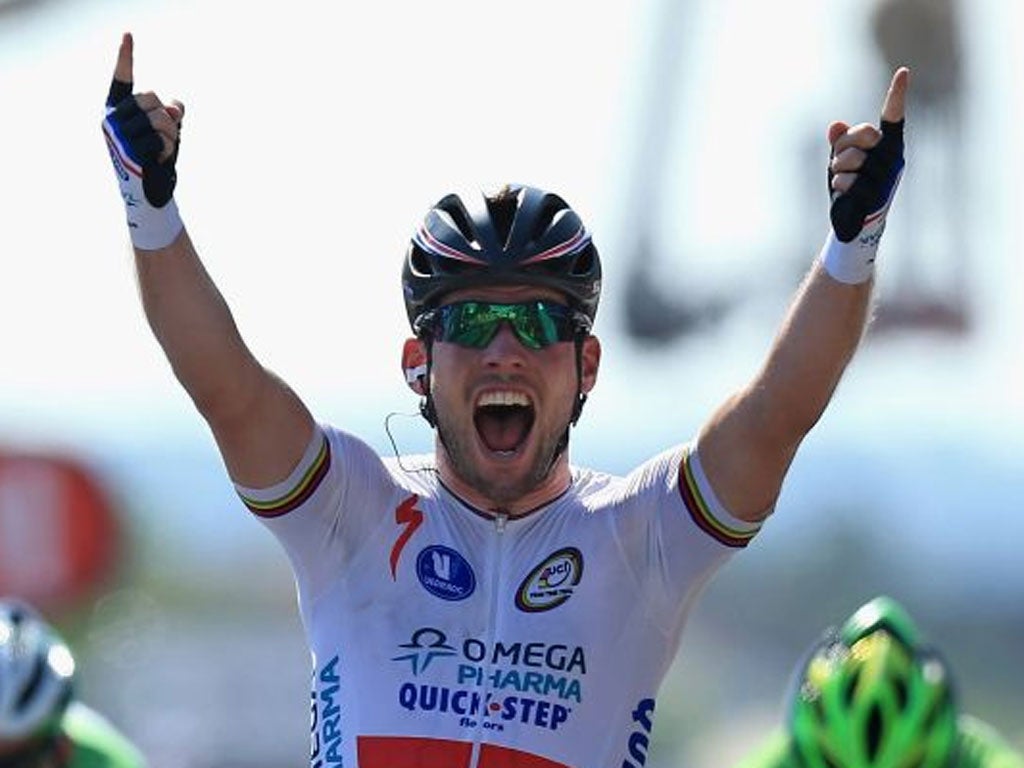Mark Cavendish and Nairo Quintana help Tour of Britain climb new highs
Home sprinter and Tour runner-up join strong line-up as race enjoys growing significance

Your support helps us to tell the story
From reproductive rights to climate change to Big Tech, The Independent is on the ground when the story is developing. Whether it's investigating the financials of Elon Musk's pro-Trump PAC or producing our latest documentary, 'The A Word', which shines a light on the American women fighting for reproductive rights, we know how important it is to parse out the facts from the messaging.
At such a critical moment in US history, we need reporters on the ground. Your donation allows us to keep sending journalists to speak to both sides of the story.
The Independent is trusted by Americans across the entire political spectrum. And unlike many other quality news outlets, we choose not to lock Americans out of our reporting and analysis with paywalls. We believe quality journalism should be available to everyone, paid for by those who can afford it.
Your support makes all the difference.Mark Cavendish had always been expected to take his place on the Tour of Britain start line in the Scottish borders town of Peebles next Sunday. But yesterday’s official confirmation of his presence, allied to that of Tour de France runner-up Nairo Quintana, one of cycling’s brightest young talents, was another step in the right direction for Britain’s ever-burgeoning tour.
Sir Bradley Wiggins had already been confirmed, topping an impressive line-up of British riders, but the entry list is also notable for other international names of repute, not just Quintana but Alessandro Petacchi, with 48 Grand Tour victories, and Stefano Pirazzi, the king of the mountains at this year’s Giro d’Italia.
Such is the calibre of the peloton that it boasts over 100 Grand Tour wins, although admittedly about 90 per cent of those belong to Cavendish and Petacchi. But the point is that a once-maligned – dare one say, second-rate – race is increasingly making its mark on the calendar.
It has a fluctuating history but has only been in its current guise for a decade, rekindled by the organisers SweetSpot in 2004. Each year, the event has grown bigger, an estimated one million spectators lining the roads for the eight days of action a year ago.
It is worth noting that the same numbers lined the streets for the men’s Olympic road race last year, though a comparison to the Olympics is unfair and, in any case, spectator numbers are expected to increase at this year’s race.
So how has it got to this point? Much of the success is down to the organisation of SweetSpot, who recently had their contract to run the race renewed from next year onwards – they are also planning a women’s event. But the Tour’s growth is also due to the success of British cycling, on the roads particularly. Last year, many people came out just to see Britain’s first Tour de France winner race through the streets of Britain on what was effectively a glorified national lap of honour – before it was cut short when Wiggins had to pull out ahead of the sixth stage with a stomach bug.
He will be in the field once more this year but it will be no sedentary pedal and an early bath, as in 2012. Following a difficult season in which he was forced out of the Giro by illness and injury, then was unable to ride in the Tour de France because of a knee problem, Wiggins will be determined to make his mark on the 16-kilometre Knowsley time-trial in particular. There, on day three, he could lay down a marker for the overall race win, though that is not his target. Wiggins, like many in the field, has eyes elsewhere, in his case the time-trial at the World Championships in Florence later this month.
In some ways, therein lies the problem with Britain’s biggest annual bike race. For many riders it is a precursor to the Worlds while for others it is a wind-down at the end of a long season. Also, it begins on the day one of the big Grand Tours, the Vuelta a Espana, finishes, which overshadows it a little. As things stand, the Tour of Britain boasts just five of the 19 World Tour teams: Sky, Garmin-Sharp, Movistar, Omega Pharma-Quick Step and Cannon- dale.
But none of those issues should be seen too negatively. It might not be quite on the premier level of bike races, but it is not far off.
It takes a while for something to get into the international psyche. Cycling as a whole had that issue in Britain, although it has to be said the sport is now more deeply rooted here than in the past. The Tour of Britain faces a battle to gain that acceptance, too. A 10-year history in its current state is mere baby steps in cycling terms, though those steps are in the right direction.
A British winner last year in Jonathan Tiernan-Locke helped the race’s profile as will something like a British time-trial battle between Wiggins and Alex Dowsett this year.
Also Yorkshire’s involvement in the start of next year’s Tour de France and the no doubt continued success of British riders will only further help the race’s cause.
Join our commenting forum
Join thought-provoking conversations, follow other Independent readers and see their replies
Comments